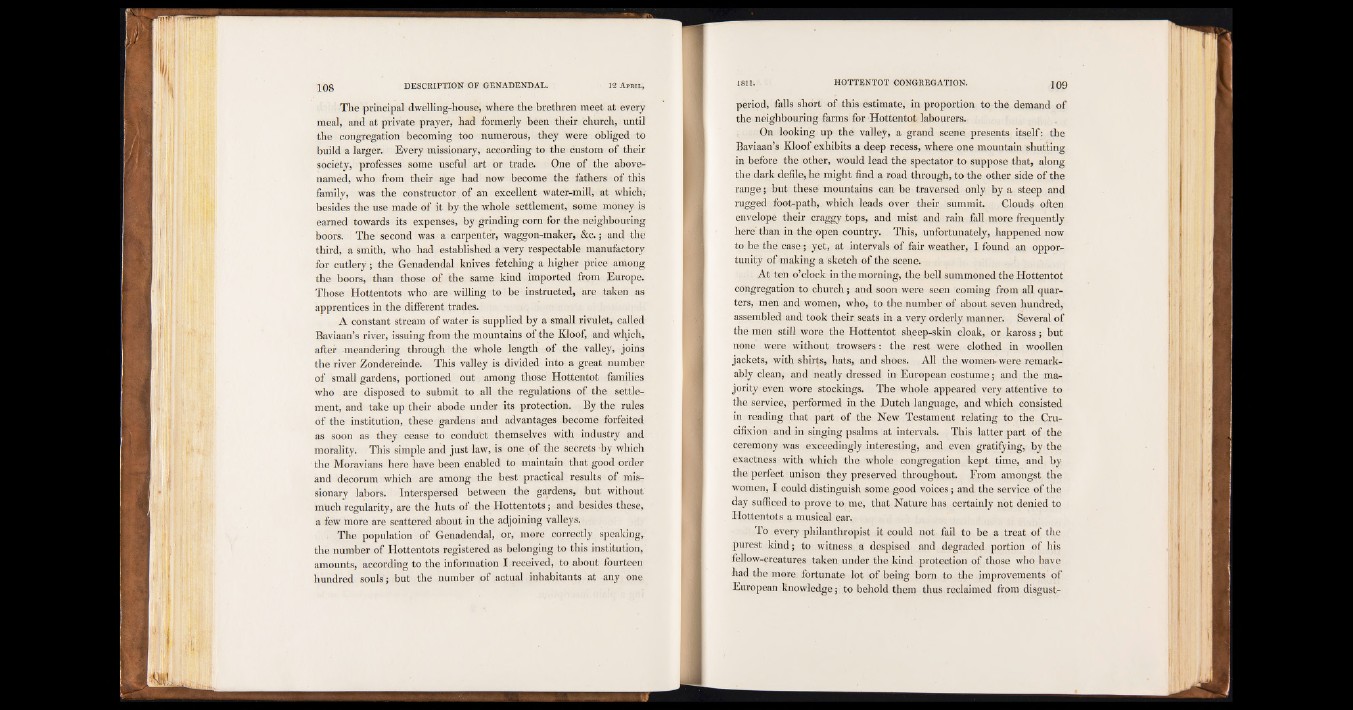
The principal dwelling-house, where the brethren meet at every
meal, and at private prayer, had formerly been their church, until
the congregation becoming too numerous, they were obliged to
build a larger. Every missionary, according to the custom of their
society, professes some useful art or trade. One of the above-
named, who from their age had now become the fathers of this
family, was the constructor of an excellent water-mill, at which,
besides the use made of it by the whole settlement, some money is
earned towards its expenses, by grinding corn for the neighbouring
boors. The second was a carpenter, waggon-maker, &c .; and the
third, a smith, who had established a very respectable manufactory
for cutlery; the Genadendal knives fetching a higher price among
the boors, than those of the same kind imported from Europe.
Those Hottentots who are willing to be instructed, are taken as
apprentices in the different trades.
A constant stream of water is supplied by a small rivulet, called
Baviaan’s river, issuing from the mountains of the Kloof, and which,
after meandering through the whole length of the valley, joins
the river Zondereinde. This valley is divided into a great number
of small gardens, portioned out among those Hottentot families
who are disposed to submit to all the regulations of the settlement,
and take up their abode under its protection. By the rules
of the institution, these gardens and advantages become forfeited
as soon as they cease to conduct themselves with industry and
morality. This simple and just law, is one of the secrets by which
the Moravians here have been enabled to maintain that good order
and decorum which are among the best practical results of missionary
labors. Interspersed between the gardens, but without
much regularity, are the huts of the Hottentots; and besides these,
a few more are scattered about in the adjoining valleys.
The population of Genadendal, or, more correctly speaking,
the number of Hottentots registered as belonging to this institution,
amounts, according to the information I received, to about fourteen
hundred souls; but the number of actual inhabitants at any one
period, falls short of this estimate, in proportion to the demand of
the neighbouring farms for Hottentot labourers.
On looking up the valley, a grand scene presents itself: the
Baviaan’s Kloof exhibits a deep recess, where one mountain shutting
in before the other, would lead the spectator to suppose that, along
the dark defile, he might find a road through, to the other side of the
range; but these mountains can be traversed only by a steep and
rugged foot-path, which leads over their summit. Clouds often
envelope their craggy tops, and mist and rain fall more frequently
here than in the open country. This, unfortunately, happened now
to be the case; yet, at intervals of fair weather, I found an opportunity
of making a sketch of the scene.
At ten o’clock in the morning, the bell summoned the Hottentot
congregation to church; and soon were seen coming from all quarters,
men and women, who, to the number of about seven hundred,
assembled and took their seats in a very orderly manner. Several of
the men still wore the Hottentot sheep-skin cloak, or kaross; but
none were without trowsers: the rest were clothed in woollen
jackets, with shirts, hats, and shoes. All the women* were remarkably
clean, and neatly dressed in European costume; and the majority
even wore stockings. The whole appeared very attentive to
the service, performed in the Dutch language, and which consisted
in reading that part of the New Testament relating to the Crucifixion
and in singing psalms at intervals. This latter part of the
ceremony was exceedingly interesting, and even gratifying, by the
exactness with which the whole congregation kept time, and by
the perfect unison they preserved throughout. From amongst the
women, I could distinguish some good voices; and the service of the
day sufficed to prove to me, that Nature has certainly not denied to
Hottentots a musical ear.
To every philanthropist it could not fail to be a treat of the
purest kind; to witness a despised and degraded portion of his
fellow-creatures taken under the kind protection of those who have
had the more fortunate lot of being born to the improvements of
European knowledge; to behold them thus reclaimed from disgust